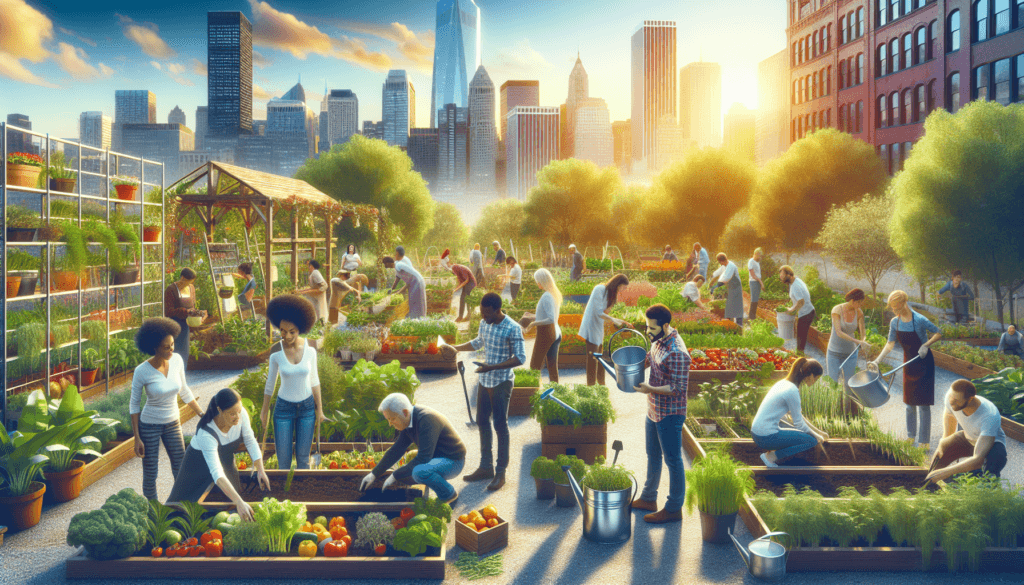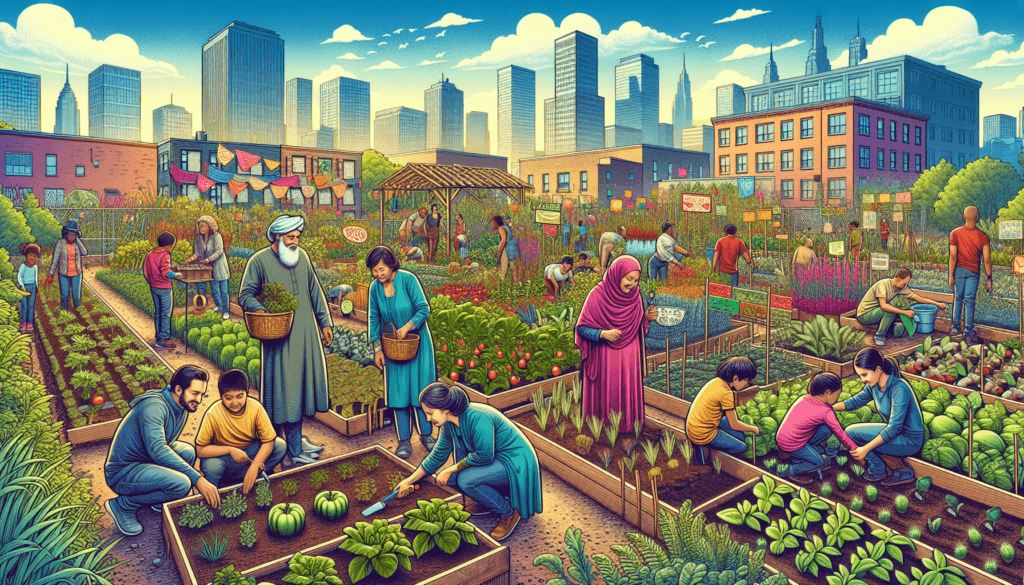Imagine a bustling city transformed by the vibrant hues of blooming flowers and the aroma of freshly picked herbs. Urban gardening, a growing trend in communities worldwide, is not only beautifying our concrete jungles, but also offering a myriad of benefits to the people who call these neighborhoods home. From providing access to fresh, nutritious food to fostering a sense of community pride and connection, urban gardening is proving to be a transformative force, revitalizing both individuals and entire communities. Join us as we explore the numerous ways in which urban gardening can positively impact the lives of those who embrace it. Urban gardening, also known as urban agriculture or urban farming, offers numerous benefits to a community. From improving food access to enhancing the environment and promoting community engagement, urban gardening has a wide range of positive impacts. Let’s explore each of these benefits in detail.

Improved Food Access
Increase in fresh produce availability
One of the primary benefits of urban gardening is the increase in fresh produce availability. By growing fruits, vegetables, and herbs in urban areas, communities can overcome the challenge of limited access to fresh and nutritious food. Unfortunately, many urban areas suffer from food deserts, where access to quality produce is scarce. Urban gardening helps address this issue by making fresh produce easily accessible to residents, promoting healthier eating habits, and ultimately improving community well-being.
Reduction in food deserts
Food deserts are areas where residents have limited access to affordable and nutritious food. Urban gardening can significantly reduce the prevalence of food deserts by increasing the availability of fresh produce in these communities. Through community gardens, rooftop gardens, and vertical farming, urban areas can transform underutilized spaces into vibrant sources of nutritious food. This reduction in food deserts has far-reaching effects, as it ensures that everyone has access to the food needed to maintain a healthy lifestyle.
Promotion of healthy eating habits
Urban gardening promotes healthy eating habits by bringing fresh produce closer to individuals and families. When people have access to their own or community-grown gardens, they are more likely to incorporate fruits and vegetables into their diets. This shift towards healthier eating plays a crucial role in preventing diet-related diseases and improving overall well-being. By fostering a culture of healthy eating, urban gardening empowers individuals to take control of their nutritional intake and make positive choices for their health.
Environmental Benefits
Improved air quality
Urban gardening contributes to improved air quality by filtering pollutants and generating oxygen. Plants naturally absorb carbon dioxide and release oxygen, thus reducing the concentration of harmful gases in the air. Additionally, urban gardens act as green buffers, helping to mitigate the effects of air pollution resulting from vehicle emissions and industrial activities. By improving air quality, urban gardening helps create healthier and more sustainable urban environments.
Reduced heat island effect
Urban areas often suffer from the heat island effect, where temperatures are significantly higher compared to surrounding rural areas. This effect is primarily due to the abundance of concrete and asphalt, which absorb and radiate heat. Urban gardening helps combat the heat island effect by introducing green spaces and vegetation that provide shade, release moisture through evapotranspiration, and cool the surrounding environment. By reducing excessive heat, urban gardening contributes to creating more livable and comfortable cities.
Water conservation
Urban gardening practices, such as rainwater harvesting and utilizing efficient irrigation techniques, promote water conservation. By collecting rainwater and using it to water plants, urban gardeners reduce reliance on freshwater sources. Additionally, implementing efficient irrigation methods, such as drip irrigation or timed sprinkler systems, minimizes water waste. As water scarcity becomes an increasing concern, urban gardening plays a crucial role in preserving this precious resource and promoting sustainable water management.

Community Engagement
Strengthening social connections
Urban gardening serves as a powerful tool for strengthening social connections within a community. When people come together to work on a shared garden, whether it’s a community garden or a school garden, they have the opportunity to collaborate, share knowledge, and build relationships. Gardening fosters a sense of belonging and facilitates meaningful interactions between individuals of diverse backgrounds, age groups, and socioeconomic statuses. It creates a space for people to connect, support one another, and develop a sense of community identity.
Promoting a sense of belonging
Urban gardening promotes a sense of belonging by providing individuals with a shared purpose and a connection to their environment. When you contribute to the growth and nurturing of plants, whether in your backyard or a communal space, you develop a sense of ownership and belonging to that space. This sense of belonging not only strengthens social connections but also instills a sense of pride in the community and a desire to contribute to its overall well-being.
Building trust and cooperation
Engaging in urban gardening activities requires collaboration and cooperation among community members. By working together to design, maintain, and harvest from community gardens, individuals develop trust in one another’s abilities and intentions. This trust translates into a stronger sense of community and a willingness to work together towards shared goals. Urban gardening serves as a catalyst for building trust and cooperation, ultimately leading to stronger and more resilient communities.
Educational Opportunities
Hands-on learning experiences
Urban gardening provides valuable hands-on learning experiences for individuals of all ages. Whether it’s through school gardens, workshops, or mentorship programs, urban gardening allows people to learn about plant life cycles, sustainable farming practices, and the importance of biodiversity. These hands-on experiences not only enhance practical knowledge but also instill a sense of wonder and appreciation for nature. Urban gardening creates a living classroom where learning happens organically and fosters a lifelong passion for environmental stewardship.
Teaching sustainable practices
In the face of a changing climate and environmental challenges, teaching sustainable practices is crucial for building a resilient future. Urban gardening offers an ideal platform to educate individuals about sustainable farming techniques, composting, rainwater harvesting, companion planting, and natural pest management. By integrating these sustainable practices into urban gardens, communities become more self-sufficient and reduce their ecological footprint. Urban gardening empowers individuals to take an active role in safeguarding the environment and practicing sustainable living.
Encouraging environmental stewardship
Urban gardening encourages environmental stewardship by instilling a sense of responsibility towards the natural world. By engaging in gardening activities, individuals develop a deeper understanding of the interconnectedness of ecosystems and recognize the impact of their actions on the environment. This heightened awareness nurtures a desire to protect and preserve nature for future generations. Urban gardening cultivates a sense of environmental stewardship, creating a generation of individuals committed to promoting ecological sustainability.

Physical and Mental Well-being
Increased physical activity
Urban gardening offers an opportunity to engage in physical activity while tending to plants, digging, watering, and harvesting. These physical tasks provide exercise that promotes cardiovascular health, strengthens muscles, and improves flexibility. Regular physical activity is essential for maintaining a healthy lifestyle and preventing chronic diseases. By integrating physical activity into daily gardening routines, urban gardening becomes a means to improve physical well-being and promote an active lifestyle.
Stress reduction and relaxation
Amidst busy urban environments, urban gardening serves as an oasis of tranquility and promotes stress reduction and relaxation. Spending time in green spaces and nurturing plants has been shown to have a calming effect on the mind and body. The act of gardening can serve as a form of meditation, allowing individuals to disconnect from the demands of daily life and find solace in nature. Urban gardening provides a peaceful retreat within the hustle and bustle of city life, promoting mental well-being and reducing stress levels.
Improved mental health
Engaging in urban gardening has been linked to improved mental health outcomes. Gardening has a therapeutic effect, with studies showing a reduction in symptoms of anxiety, depression, and stress among individuals who regularly garden. The act of nurturing plants and witnessing their growth provides a sense of purpose, accomplishment, and connection to the natural world. Urban gardening creates a positive environment that supports mental well-being and contributes to overall happiness and life satisfaction.
Economic Benefits
Potential for small-scale entrepreneurship
Urban gardening presents opportunities for small-scale entrepreneurship and micro-business development. By growing and selling produce locally, individuals can generate income and contribute to the local economy. Urban farmers can explore avenues such as organic farming, specialty crops, or value-added products to cater to niche markets. The potential for small-scale entrepreneurship enhances economic mobility and empowers individuals to pursue their passions while making a living from urban gardening.
Job creation and skills development
The growth of urban gardening translates into job creation and skills development within a community. As urban gardens expand, the need for gardeners, educators, coordinators, and maintenance staff increases. These employment opportunities extend to people of diverse backgrounds and skill sets, including youth, seniors, and individuals with limited job prospects. Urban gardening not only creates new jobs but also provides a platform for skills development, enabling individuals to acquire new expertise and improve their employability.
Local economic growth
Urban gardening contributes to local economic growth by supporting local businesses and reducing dependence on imported produce. When communities embrace urban gardening, they create a demand for gardening supplies, seeds, tools, and related products. This increased demand stimulates local businesses, creating a ripple effect on the economy. Moreover, by producing and consuming locally grown food, communities retain their spending within the local economy, which further strengthens local businesses and supports sustainable economic growth.

Green Space Enhancement
Beautification of urban areas
Urban gardening plays a significant role in beautifying and enhancing the aesthetic appeal of urban areas. By introducing green spaces, flowers, and thriving gardens, urban environments become visually appealing and pleasant to inhabit. The presence of colorful blooms and vibrant greenery creates a welcoming atmosphere, positively impacting residents’ well-being. The beautification brought by urban gardening instills a sense of pride in the community and transforms once neglected or barren spaces into visually appealing and vibrant landscapes.
Creation of wildlife habitats
Urban gardening contributes to the creation of wildlife habitats and supports biodiversity in urban areas. By growing a diverse range of plants, urban gardens provide food, shelter, and nesting opportunities for birds, insects, and other wildlife. This harmonious coexistence between humans and nature fosters ecological balance and promotes the survival of native species. Urban gardens become oases of biodiversity, attracting a variety of wildlife and enhancing the urban ecosystem as a whole.
Providing recreational spaces
Urban gardening provides much-needed recreational spaces in densely populated areas. Community gardens, rooftop gardens, and public green spaces offer residents a place to escape the urban hustle and connect with nature. People can engage in leisure activities, such as picnicking, reading, or simply enjoying the tranquility of a garden setting. These recreational spaces enhance the quality of life for urban residents, offering a respite from the concrete jungle and allowing individuals to recharge and rejuvenate in a natural environment.
Climate Resilience
Mitigation of urban heat
Urban gardening plays a crucial role in mitigating urban heat, reducing the impact of the heat island effect. As plants transpire and release moisture through their leaves, they cool the surrounding air and mitigate the excessive heat in urban areas. The shade provided by trees and vegetation also helps to shield buildings and outdoor spaces from direct sunlight, preventing them from absorbing and radiating excessive heat. By mitigating urban heat, urban gardening contributes to creating sustainable and resilient cities that are better adapted to rising temperatures.
Enhanced stormwater management
Urban gardening supports enhanced stormwater management by reducing the runoff of rainwater. Green spaces allow rainwater to infiltrate the soil, preventing excessive runoff that can cause flooding and overwhelm stormwater infrastructure. Plants’ roots absorb rainwater, acting as natural sponges that promote groundwater recharge. By incorporating urban gardens and green infrastructure into cities, communities can effectively manage stormwater, reduce the strain on existing drainage systems, and prevent water-related disasters.
Biodiversity conservation
Urban gardening promotes biodiversity conservation by creating habitats for a wide range of plant and animal species. By growing native plants and incorporating pollinator-friendly gardens, urban areas provide a refuge for bees, butterflies, and birds, which play a vital role in pollination and ecosystem health. By supporting biodiversity, urban gardening contributes to the preservation of endangered species, maintains ecological balance, and enhances the overall resilience of urban ecosystems.

Community Empowerment
Increased self-sufficiency
Urban gardening empowers communities by promoting self-sufficiency and reducing reliance on external food sources. By growing their own food, individuals and families become less dependent on commercial agriculture and gain control over their food supply. This increased self-sufficiency instills a sense of empowerment, as communities can better navigate food crises, economic instability, and natural disasters. Urban gardening equips individuals with the skills and resources needed to secure their food and make informed choices about their nutritional needs.
Fostering community pride
Urban gardening fosters community pride by creating spaces that reflect the values and aspirations of the residents. When individuals contribute to the growth and maintenance of community gardens, they develop a sense of ownership and pride in their neighborhood. Urban gardens become symbols of community identity, showcasing the collective efforts and care invested in their creation. This sense of pride strengthens community ties, enhances the overall perception of the neighborhood, and fuels further community-led initiatives.
Empowering marginalized groups
Urban gardening has the power to empower marginalized groups within a community. By providing opportunities for skill development, income generation, and community engagement, urban gardening allows individuals from disadvantaged backgrounds to overcome barriers and build a better future. Access to urban gardening spaces and resources enables marginalized individuals to develop new skills, gain confidence, and take an active role in their communities. Urban gardening becomes a tool for social inclusion, empowering marginalized groups and giving them a voice in shaping their communities.
Food Security
Supplementing food supplies
Urban gardening helps to supplement food supplies and reduce reliance on external sources of food. By cultivating fruits, vegetables, and herbs in urban areas, communities can ensure a more consistent and reliable supply of fresh produce. This becomes particularly important during times of food shortages or disruptions in the food supply chain. Urban gardens act as a supplementary food source, providing an additional layer of food security and reducing the vulnerability of communities to food scarcity.
Emergency food sources
During times of crisis, such as natural disasters or economic downturns, urban gardens can serve as emergency food sources. The ability to grow and harvest food locally allows communities to quickly respond to food shortages and provide essential nourishment to those in need. By leveraging the potential of urban gardening, communities can establish emergency food systems that support vulnerable populations and ensure access to nutritious food during challenging times.
Building resilience against food shortages
Urban gardening builds resilience against food shortages by diversifying food sources and strengthening local food systems. By incorporating urban gardens into the urban fabric, communities become less dependent on distant and fragile agricultural systems. In times of crisis or disruptions, urban gardening serves as a safety net, ensuring that communities have access to fresh produce and reducing the impact of food shortages. Building resilience through urban gardening helps communities weather unpredictable situations and prioritize food security for all.


